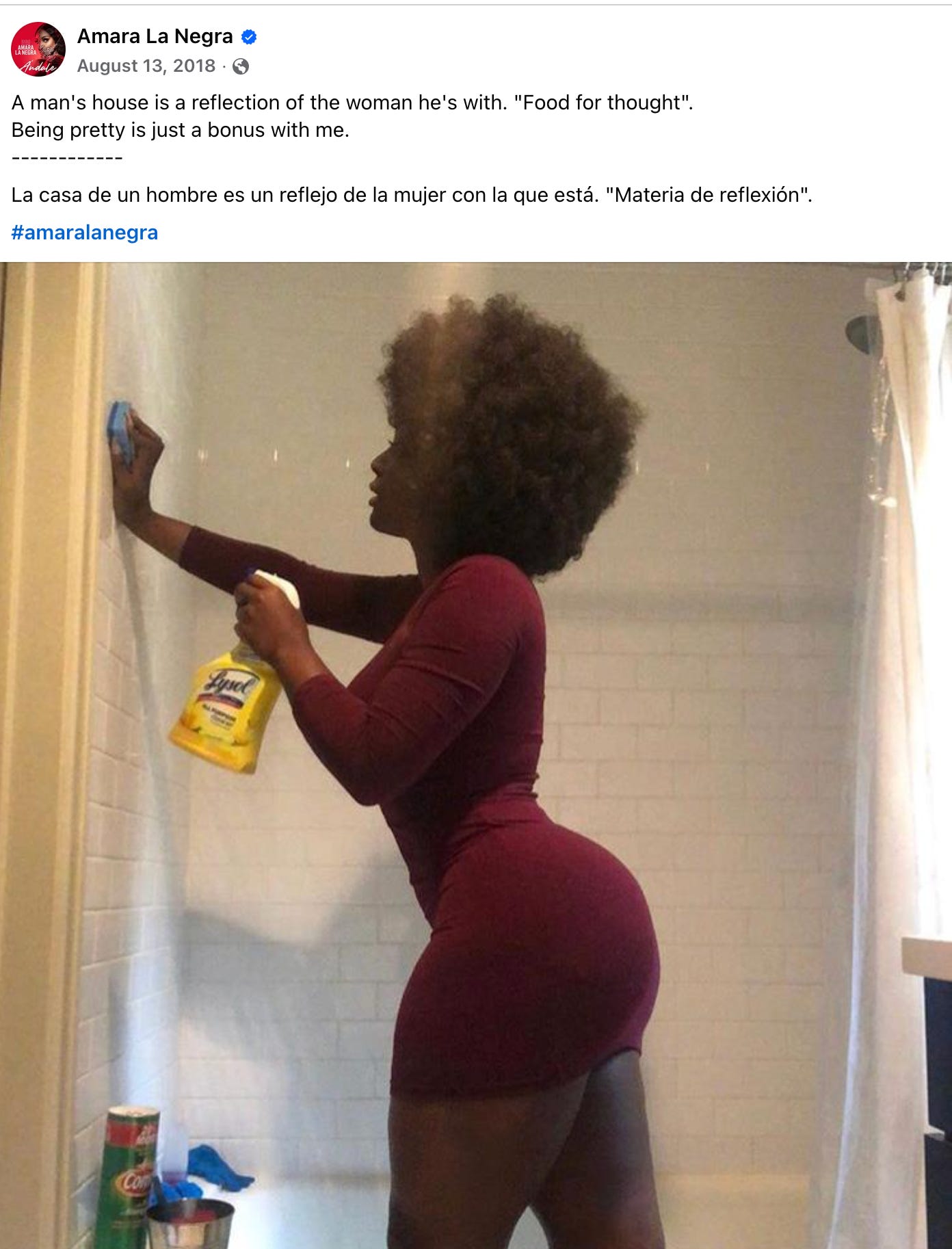NOBODY KNOWS WHAT A PICK-ME IS
The term "pick-me" originated in the Black American community to mock bitchy women. Mainstream liberal progressives stupidly appropriated the term to disparage all displays of femininity.
The weird thing about gender and dating discourse on the internet is that many of us have different notions of what is appropriate in dating, our expectations and values based on our cultural backgrounds.
With that said, the term “pick-me” actually originated in the Black American online community in the early 2010s, and its meaning has since been altered because few people understand the context of its creation.
“Ladies! Your home should be clean while your man is at work. If you can’t keep house, don’t expect to keep a man.” These sorts of memes were common in the 2010s. Accompanying the caption was a photograph that typically featured the poster, a Black woman, posing as a domestic goddess.
The image above is of Dominican-American influencer and model, Amara La Negra.
This attitude isn’t all that surprising and is fairly common within Black American culture. It’s particularly prevalent among church-going types, although I’d say the community as a whole tends to be socially conservative.
Within that context, romantic relationships have clear gender role expectations. When I was a child, I don’t remember my father cooking or cleaning at all. That duty was left to my stepmother. This wasn’t considered unusual or unfair.
Anyway, as these images became more prevalent on social media, millennial Black women began to mock them. So in the original context, “pick-me” meant a woman who put down other women for male approval. The specific offense wasn’t having traditional preferences or even living traditionally—it was the public performance of superiority over other women, the “I’m not like other girls” energy paired with explicit put-downs.
Simple, right?
Most cultures have some version of women competing for male attention and approval. What made the original “pick-me” posts so offensive wasn’t that these women had traditional values or wanted to attract men with domestic skills. It was that they broke the unspoken rule: you’re not supposed to say it out loud. You’re not supposed to explicitly position yourself as superior to other women in the competition for male approval.
The whole discourse around “pick-me” reveals our collective anxiety about acknowledging that female competition exists. We’ve created an elaborate performance of female solidarity that requires pretending we’re not competing, even when we obviously are. The “pick-me” label functions as social punishment for breaking this code.
As the term left the Black community, it’s also lost much of its actual meaning.
Given that femininity and gender expression vary cross-culturally, this isn’t all that surprising. Mainstream liberal feminist leaning people have appropriated the term to basically mean “any woman who doesn’t perform progressive feminism correctly.” Which is …odd.
Woman like to cook for her boyfriend? Pick-me. Do women have traditional relationship preferences? Pick-me. Woman not identify with certain feminist positions? Pick-me. The term has become a catch-all for policing women who make different choices.
The irony is delicious. Calling someone a “pick-me” is itself a form of female competition. It’s just competing for social capital and moral status within female hierarchies rather than competing for male approval. Both are forms of intrasexual competition. We’re just more comfortable with one than the other.
We’ve collectively decided that competing to be the most enlightened feminist, the most politically correct, the most morally superior woman is acceptable.
But competing for romantic or sexual success by emphasizing traditionally feminine qualities? Unacceptable. Both involve women positioning themselves above other women. Both involve claiming “I’m better than those other women.” The only difference is what you’re claiming to be better at.
The original “pick-me” callout served a purpose: it named a specific toxic behavior of women tearing down other women for male validation. But now it’s been weaponized into a tool for policing any woman who steps outside progressive orthodoxy about gender roles.
The discourse has come full circle, and nobody seems to notice.





YES. Couldn't agree more, Amina. This term gets thrown around all over social media and it's such a strange attempt at a dunk. Like, pardon me for trying to be my best self and having some amount of traditional values, rather than a desire to burn the entire system to the ground.
This article has a powerful message. It's a shame women tear each other down, and using 'pick me' to describe any kind of woman doing anything that doesn't fit in with ideals is a shame. Men aren't worth fighting over either the number of men who let ppl down is astounding TT-TT